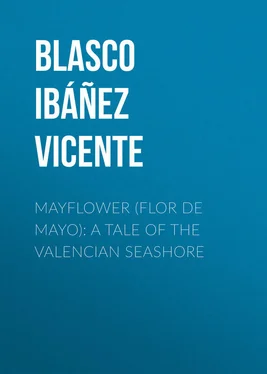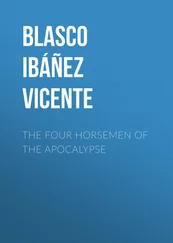Vicente Blasco Ibáñez - Mayflower (Flor de mayo) - A Tale of the Valencian Seashore
Здесь есть возможность читать онлайн «Vicente Blasco Ibáñez - Mayflower (Flor de mayo) - A Tale of the Valencian Seashore» — ознакомительный отрывок электронной книги совершенно бесплатно, а после прочтения отрывка купить полную версию. В некоторых случаях можно слушать аудио, скачать через торрент в формате fb2 и присутствует краткое содержание. Жанр: foreign_antique, foreign_prose, на английском языке. Описание произведения, (предисловие) а так же отзывы посетителей доступны на портале библиотеки ЛибКат.
- Название:Mayflower (Flor de mayo): A Tale of the Valencian Seashore
- Автор:
- Жанр:
- Год:неизвестен
- ISBN:нет данных
- Рейтинг книги:3 / 5. Голосов: 1
-
Избранное:Добавить в избранное
- Отзывы:
-
Ваша оценка:
- 60
- 1
- 2
- 3
- 4
- 5
Mayflower (Flor de mayo): A Tale of the Valencian Seashore: краткое содержание, описание и аннотация
Предлагаем к чтению аннотацию, описание, краткое содержание или предисловие (зависит от того, что написал сам автор книги «Mayflower (Flor de mayo): A Tale of the Valencian Seashore»). Если вы не нашли необходимую информацию о книге — напишите в комментариях, мы постараемся отыскать её.
Mayflower (Flor de mayo): A Tale of the Valencian Seashore — читать онлайн ознакомительный отрывок
Ниже представлен текст книги, разбитый по страницам. Система сохранения места последней прочитанной страницы, позволяет с удобством читать онлайн бесплатно книгу «Mayflower (Flor de mayo): A Tale of the Valencian Seashore», без необходимости каждый раз заново искать на чём Вы остановились. Поставьте закладку, и сможете в любой момент перейти на страницу, на которой закончили чтение.
Интервал:
Закладка:
Vicente Blasco Ibáñez
Mayflower (Flor de mayo): A Tale of the Valencian Seashore
CHAPTER I
THE WIDOW'S TAVERN
The morning of that day – it was a Tuesday of the Lenten season – could not have dawned more promisingly. The sea, off the Cabañal, was in flat calm, as smooth as a polished mirror. Not the slightest ripple broke the shimmering triangular wake that the sun sent shoreward over the lifeless surface of the water.
The fishing fleet had headed, bright and early, for the grounds off the Cabo de San Antonio; and all the seines were out to take full advantage of the perfect weather. Prices on the market of Valencia were running high; and every skipper was trying to make a quick catch and get back first to the beach of the Cabañal, where the fisherwomen were waiting impatiently.
Toward noon the weather changed. An easterly wind came up, the dread levante , that can blow so wickedly in the gulf of Valencia. The sea at first was lightly wrinkled; but as the hurricane advanced the placid looking-glass gave way to a livid menacing chop, and piles of cloud came racing up from the horizon and blotted out the sun.
Great was the alarm along shore. In the eyes of those poor people, familiar with all the tragedies of the sea, wind from that quarter always meant one of those storms that bring sorrow and mourning to the homes of fishermen. In dismay, their skirts whipping in the blow, the women ran back and forth along the water's edge, wailing and praying to all the saints they trusted. The men at home, pale and frowning, bit nervously at the ends of their cigars, and, from the lee of the boats drawn up on the sand, studied the lowering horizon with the tense penetrating gaze of sailormen, or nervously watched the harbor entrance beyond the Breakwater on whose red rocks the first storm waves were breaking. What was happening to so many husbands and fathers caught with their nets down off shore? Each succeeding squall, as it sent the terrified watchers staggering along the beach, called up the thought of strong masts snapping at the level of the deck and triangular sails torn to shreds, perhaps at that very moment!
About three o'clock on the black horizon a line of sails appeared, driving before the gale like puffs of foam that vanished suddenly in the troughs of the waves to dart back into view again on the crests succeeding. The fleet was returning like a frightened herd in stampede, each boat plunging in the combers with the bellow of the tempest upon its heels. Would they make the lee of the Breakwater? The wind in devilish playfulness would here tear off a shred of canvas, there a yard, and there a mast or a tiller, till a rudderless craft, caught abeam by a mountain of greenish water, would seem surely to be swallowed up. Some of the boats got in. The sailors, drenched to the skin, accepted the embraces of their wives and children impassively, with vacant and expressionless eyes, like corpses suddenly resurrected from the tomb.
That night was long remembered in the Cabañal.
Frenzied women, with their hair down and lashing in the hurricane, their voices hoarse from the prayers they shouted above the howling gale, spent the whole night on the Breakwater, in danger of being swept off by the towering surf, soaked with the brine from the biting spray, and peering out into the blackness as though bent on witnessing the lingering agony of the last stragglers.
Many boats did not appear. Where could they be … ay Diós, Diós! Happy the women who had their sons and husbands safe in their arms! Other boys were out in that tumbling hell, driving through the night in a floating coffin, tossing from white cap to white cap, dizzily plunging into the yawning trough, while decks groaned beneath their feet, and gray hills of water curled above to break down upon them in a destroying surge!
It rained all night long. Many women waited out till sunrise, drawing their soaked cloaks about their shivering bodies, kneeling in the black mud and coal-dust on the Breakwater, shrieking their prayers to be sure that God would hear, or, again, in desperate rage, stopping to tear their hair and hurl the most frightful blasphemies of the Fishmarket up toward heaven.
And when dawn came, what a glorious dawn it was! As if nothing at all had happened, the sun lifted a smiling hypocritical face above the line of a clean horizon, and spread a broad uneasy glitter of golden beauty over waters that peacefully carried long streaks of foam from the night's turmoil. The first thing that the rays of morning gilded was the battered hulk of a Norwegian barkentine ashore off the Beach of Nazaret, its nose buried in the sand, its midships awash, its bilges agape and in splinters, while strips of canvas floated from the rigging tangled about the broken masts.
The ship had carried a cargo of Northern lumber. Pushed gently along by the lapping waves, timbers and boards were slowly drifting ashore, where they were dragged out by swarms of black ants and disappeared as though sunk in the sand. And they worked hard, those ants. The storm was just what they had been waiting for. Beach-pirates were whipping up their horses gayly along all the roads leading to the huerta of Ruzafa. Boards like that would make such fine houses! And the booty was all theirs by rights! What did it matter if a girder were stained, perhaps, with the blood of one of those poor foreigners lying dead back there upon the shore?
Groups of idlers were gathered, with a few policemen, around some corpses that were stretched out on the beach some distance from the water. Strong, handsome fellows they had been, light-haired all; and bits of white skin, soft and smooth, though muscular, could be seen through the rents in their garments, while their blue eyes, glassy and staring in death, looked up at the sky with a mysterious fixity.
The Norwegian had been the most sizeable wreck of the blow, and the newspapers in town gave columns to it. The population of Valencia turned out as on a pilgrimage to look at the hulk, half sunken in the shifting sands. No one gave a thought to the lost fishing boats, and people seemed not to understand the wailing and lamentations of the poor women whose men had not come home.
The disaster to the fleet was not, however, so great as they had thought. The morning wore on and several boats came in that had been given up for lost. Some had made Denia or Gandia. Others had taken refuge in Cullera Harbor. And each craft that appeared roused cheers of rejoicing and thanksgiving throughout the village, which joyfully made vows to all the saints who look after men of the sea.
In the end only one was not accounted for – the boat of tio Pascualo, the most thrifty saver of all the savers in the Cabañal, a man, decidedly, with an eye for money, a fisherman in winter and a smuggler in summer, a great skipper, and a frequent visitor to the coasts of Algiers and Oran, which he spoke of always as "across the way," as though Africa were on the sidewalk across the street.
Pascualo's wife, Tona, spent more than a week on the Breakwater, a suckling baby in her arms and another child, a chubby little lad, clinging to her skirts. She was sure Pascualo would come home; and every time a fresh detail of the storm was given her, she would tear her hair and renew her screams for the Holy Virgin's help. The fishermen never talked right out to her, but always stopped at the significant shrug of the shoulders. They had seen Pascualo last off the Cabo, drifting before the gale, dismasted. He could not have gotten in. One man had even seen a huge green wave break over him, taking the boat abeam, though he could not swear the craft had foundered.
In alternate spells of desperation and strange exhilarated hope, the miserable woman waited and waited with her two children. On the twelfth day, a revenue cutter came into the port of the Cabañal, towing tio Pascualo's boat behind, bottom-up, blackened, slimy and sticky, floating weirdly like a big coffin and surrounded by schools of fish, unknown to local waters, that seemed bent on getting at a bait they scented through the seams of the wrecked hull.
Читать дальшеИнтервал:
Закладка:
Похожие книги на «Mayflower (Flor de mayo): A Tale of the Valencian Seashore»
Представляем Вашему вниманию похожие книги на «Mayflower (Flor de mayo): A Tale of the Valencian Seashore» списком для выбора. Мы отобрали схожую по названию и смыслу литературу в надежде предоставить читателям больше вариантов отыскать новые, интересные, ещё непрочитанные произведения.
Обсуждение, отзывы о книге «Mayflower (Flor de mayo): A Tale of the Valencian Seashore» и просто собственные мнения читателей. Оставьте ваши комментарии, напишите, что Вы думаете о произведении, его смысле или главных героях. Укажите что конкретно понравилось, а что нет, и почему Вы так считаете.












